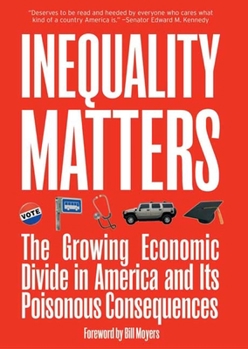Inequality Matters: The Growing Economic Divide in America and Its Poisonous Consequences
Select Format
Select Condition 
Book Overview
Since the 1970s, the U.S. economy has been sending more and more of its rewards to fewer and fewer people. Once seen as a global exemplar of egalitarianism and middle-class opportunity, America has become the most unequal of developed nations--a land where corporate leaders earn hundreds of times the pay of average workers, and the only population group growing faster than millionaires is the uninsured. Statistics aside, this quarte-century-long trend...
Format:Paperback
Language:English
ISBN:1595581758
ISBN13:9781595581754
Release Date:August 2007
Publisher:New Press
Length:328 Pages
Weight:0.85 lbs.
Dimensions:0.9" x 5.3" x 7.4"
Customer Reviews
2 ratings
Unequal Representation but Good Essays
Published by Thriftbooks.com User , 18 years ago
"Inequality Matters" is a collection of 22 essays by different authors about the growing gap between the rich of America and the rest of us. The best is Bill Moyers' opening -- and passionate -- shot at the "plunder of public trust" and the "spectacle of corruption" that is the present day situation of the United States. All of the essays which follow are convincing on the growing gap betweeen rich and poor in areas such as education, retirement, wages, taxes, and health. This is perhaps the most important long-term issue facing American society. The weakness of the book is that it is one-sided, a liberal feast on the faults of the conservatives and corporations. I agree with the liberals, but I would like to see some responses from conservatives. (Not that any conservative would venture like a Christian into this arena of leonine liberals. And, would that liberals were a bit more like lions and a little less like liberals!) You won't find any attempt at balance. It illustrates another problem in the U.S: the liberals talk to only liberals and the conservatives talk only to conservatives. But without an opportunity for the other side to answer back you can't be sure how biased or incorrect the essays may be. So read the book because it's good, but also read a conservative book before you take to the street promoting "class warfare" and a crusade against the rich. After reading both sides -- you'll take to the streets. Smallchief
Inequality Matters -- and How!
Published by Thriftbooks.com User , 18 years ago
Midway through 2004, veteran journalist James Lardner, with the help of the Demos think tank in New York, put together the first national conference directly focused on economic inequality - the gap between America's rich and everyone else - since that gap started widening in the late 1970s. This Inequality Matters conference drew several hundred people to New York University for a weekend of robust discussion and debate. But few outside NYU's conference rooms ever noticed. America's ever more unequal business as usual rolled on unabated. Here's hoping that Inequality Matters the book can do what Inequality Matters the conference could not - trigger a long-overdue bit of national introspection over the incredible concentration of income and wealth we Americans have witnessed ever since Jimmy Carter begat Ronald Reagan. Today's conventional wisdom, of course, simply denies that this concentration of wealth makes any difference. So long as "even a have-not can have a VCR and a cellphone," argue the apologists for inequality who saturate our politics and our media, what possible reason could we have to worry about whether our richest are getting fantastically richer? Inequality Matters the book takes on this question, in a series of essays inspired by Inequality Matters the conference. Ably edited by James Lardner and Demos senior fellow David Smith, this book's pages abound in insights - on everything from housing and health to happiness - that even regular readers of progressive books and periodicals will find fresh and provocative. One example: Communities with the widest income gaps between top and middle, Cornell economist Robert Frank points out in his contribution, turn out to display "significantly higher personal bankruptcy rates, divorce rates, and average commute times." Apologists for inequality, beware! With the publication of Inequality Matters, your case - that we need not worry about the wealth of the wealthy - has never seemed more dim-witted. Or dangerous. Excerpted from a longer review that appears in the January 2, 2006 edition of Too Much (www.toomuchonline.org)






